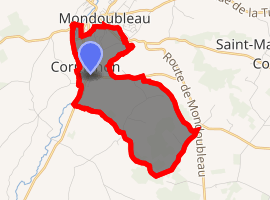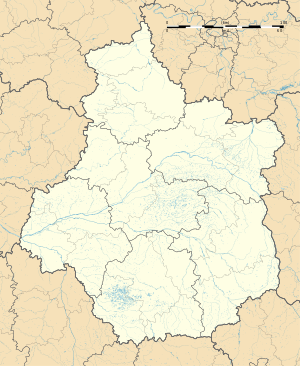Cormenon
Cormenon is a commune in the Loir-et-Cher department of central France.
Cormenon | |
|---|---|
 Coat of arms | |
Location of Cormenon 
| |
 Cormenon  Cormenon | |
| Coordinates: 47°58′09″N 0°53′40″E | |
| Country | France |
| Region | Centre-Val de Loire |
| Department | Loir-et-Cher |
| Arrondissement | Vendôme |
| Canton | Le Perche |
| Intercommunality | Collines du Perche |
| Government | |
| • Mayor (2014–2020) | Gilles Boulay |
| Area 1 | 5.76 km2 (2.22 sq mi) |
| Population (2017-01-01)[1] | 690 |
| • Density | 120/km2 (310/sq mi) |
| Time zone | UTC+01:00 (CET) |
| • Summer (DST) | UTC+02:00 (CEST) |
| INSEE/Postal code | 41060 /41170 |
| Elevation | 102–210 m (335–689 ft) (avg. 110 m or 360 ft) |
| 1 French Land Register data, which excludes lakes, ponds, glaciers > 1 km2 (0.386 sq mi or 247 acres) and river estuaries. | |
Population
| Year | Pop. | ±% |
|---|---|---|
| 1793 | 350 | — |
| 1806 | 432 | +23.4% |
| 1821 | 479 | +10.9% |
| 1831 | 465 | −2.9% |
| 1841 | 464 | −0.2% |
| 1851 | 474 | +2.2% |
| 1861 | 446 | −5.9% |
| 1872 | 480 | +7.6% |
| 1881 | 696 | +45.0% |
| 1891 | 606 | −12.9% |
| 1901 | 772 | +27.4% |
| 1911 | 667 | −13.6% |
| 1921 | 607 | −9.0% |
| 1931 | 655 | +7.9% |
| 1946 | 602 | −8.1% |
| 1954 | 520 | −13.6% |
| 1962 | 557 | +7.1% |
| 1968 | 655 | +17.6% |
| 1975 | 756 | +15.4% |
| 1982 | 733 | −3.0% |
| 1990 | 717 | −2.2% |
| 1999 | 690 | −3.8% |
| 2008 | 690 | +0.0% |
| 2013 | 698 | +1.2% |
gollark: https://sfw.furaffinity.net/view/30712214 ← brain uploading, but it is a "fursona" for some reason
gollark: Hmm. It appears to have spontaneously beeized now that I changed a thing.
gollark: As you can see, *μhahahaha*.
gollark: ·
gollark: ↓ not to be trusted
References
- "Populations légales 2017". INSEE. Retrieved 6 January 2020.
| Wikimedia Commons has media related to Cormenon. |
This article is issued from Wikipedia. The text is licensed under Creative Commons - Attribution - Sharealike. Additional terms may apply for the media files.